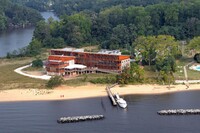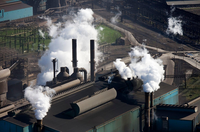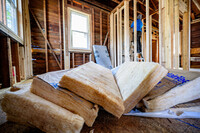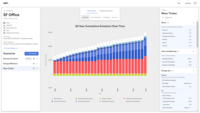Blog Post
Transparency, Advocacy and the Future of the Built Environment
As the 101st president of AIA National, Evelyn Lee is rising to the current challenges in architecture and beyond with a clear upward trajectory informed by a unique background and philosophy. “My path here has been anything but conventional,” Lee said in her inauguration speech. “The road hasn’t always been easy, and I know that there... Read more
Blog Post
Fire survivors who lost everything in the January fire are coming together to support their own as they work to rebuild and recover. Several community organizers from Team Palisades and beyond will speak this Saturday at the WestEdge design fair.
“I started the night of the event,” architect and designer May Sung says of her community rebuilding efforts needed as a result of the Palisades fire. “I was getting texts from all my clients, neighbors and friends.” Would my home survive? (Comparatively few did.) Do I have time to get out? (Barely.) There was confusion in the evacuation... Read more
Blog Post
The art at the annual exhibition and the worries it addresses
The designers who participated in the 19th Biennale d’Architettura di Venezia all began with the same environmental anxiety—what the critic Ian Volner called a, “searching, no-bad-ideas rap session on the human prospect”—and concluded with vastly different forms of community-mindedness, ethical decarbonization and radical regeneration. But the... Read more
Blog Post
Visit the Chicago Architecture Biennial (CAB) from now until February 28, 2026.
The Chicago Architecture Biennial (CAB) kicked off its grand opening on Friday, September 19, 2025, led by Artistic Director Florencia Rodriguez. There are over 400 original projects with numerous installations located in the Chicago Cultural Center (78 E. Washington Street, Chicago, IL 60602) as well as select locations throughout... Read more
Blog Post
The September 29 event brings together green building organizations for a collaborative event that focuses on directing policy to create healthy buildings and healthier communities worldwide
The International WELL Building Institute (IWBI), in partnership with Georgetown University’s Global Cities Initiative, is proud to host its second annual Healthy Building Policy Summit in Washington, D.C., on September 29. This landmark, full-day event is dedicated to exploring the critical role of policy at all levels of government in... Read more
Blog Post
Green Econome founder Marika Erdely reflects on the Palisades blaze and how fire hardening measures may have saved her home
January 7, 2025, started off like any other morning in my Malibu neighborhood. I woke up and took a deep look at the ocean view that I can luckily see from my bed and thanked the universe that I am as fortunate as I am to be able to live in this slice of paradise. I open my slider and let out my darling English Black Lab, Bear. She pounces out... Read more
Blog Post
The Italian designer infused his postmodern resin visions into the offices of the forward-thinking firm, and the world wasn't ready for it.
In 1994, Jay Chiat of advertising firm TBWA/Chiat/Day invited Gaetano Pesce to design the company’s New York City office. Pesce responded with one of the most controversial and radical workplace interiors ever built. His approach abandoned normal materials and corporate formalities in favor of colorful, sculptural environments. The space... Read more
Feature
How similar is LEED v5 to v4.1 and other past versions? The newest version seeks to transform the rating system to be more accessible and holistically impactful.
Version 5 of the Leadership in Energy and Environmental Design (LEED) green building certification program has been in the making for years. LEED v5 did not have a foreseeable public timeline a little more than five years ago (BuildingGreen, 2019). Now, to celebrate the 25th year anniversary of the first LEED for New Construction... Read more
Blog Post
BuildingGreen Reports from the 2025 AIA Conference on Architecture
Most of the attendees at this year’s AIA Conference on Architecture (June 4-7) couldn’t believe their bad luck—it was 90 degrees in the shade. In June. In Boston.
They escaped cities like Atlanta, Phoenix and Tulsa, which averaged 89 degrees that week, so this was supposed to be a mild junket on the banks of the River Charles... Read more
Feature
The current presidential administration has made many changes to preserved policies in the EPA, NSF, and more branches. Catch up on what may have been missed.
A public program collecting and reporting greenhouse gas emissions since 2010 from approximately 8,000 facilities a year is next to be cut in Trump’s administration. The Greenhouse Gas Reporting Program accounts for 85% to 90% of all greenhouse emissions in the United... Read more
Explainer
Most low-carbon strategies are complementary, but not always. When is a carbon savings worth a carbon penalty?
I could press the snooze button on my alarm and get a little more sleep. But, then I might be late to work again. A classic tradeoff.
As our tools become better at estimating carbon impacts, it has become clear that there are also tradeoffs between embodied carbon and operational carbon. Efforts to reduce one might increase the other.... Read more
News Analysis
The initiative offers a set of actions for the international building sector to collaborate on decarbonization and resilience
Ever wonder how the building sector is contributing to the goals of the Paris Agreement?
Look no further than the Buildings Breakthrough, an initiative to drive international collaboration to make near-zero-emission and resilient buildings the new normal by 2030. Launched at the 2023 U.N. Conference of the Parties (COP28), the Buildings... Read more
Op-Ed
In a letter to the editor, the Sustainable Forestry Initiative details eight objections to BuildingGreen’s evaluation of its programs.
After reviewing the BuildingGreen report: Wood Certification: Comparing Programs and Their Impacts, we note a strong bias in its tone, selective focus, blatant errors, and omission of critical facts. Overall, the report uses erroneous and ambiguous language to portray SFI inaccurately and negatively while presenting FSC in a disproportionately... Read more
News Brief
Three existing buildings: a retail space, an office skyscraper, and high-rise apartments achieved LEED certification under the new v5 rating system.
USGBC announced the first three projects certified under the new LEED v5 Operations & Maintenance (O+M) rating system, still in beta testing.
In LEED v5 O+M, USGBC has added prerequisites and credits focused on carbon, health, equity, and resilience. For instance, project teams are now required to assess a building’s resilience and... Read more
Product Review
The Greenbuild expo always showcases innovative products and industry trends. This year there were some significant seismic shifts in the green products displayed and the ideas presented.
When people think of the Greenbuild expo floor, their perceptions are not usually those of music, art, or beauty. But it is a bit of an art navigating schedules and meetings in order to see products and talk to manufacturers amongst the cacophony of the crowd, concrete floors, and cavernous space.
If art does reflect the times we live... Read more
News Brief
With independence, C.Scale aims to advance building decarbonization
Architecture firm EHDD announced on November 12 that it’s established a new company, C.Scale, as an independent public benefit corporation. Jack Rusk, EHDD’s former director of climate strategy, left the firm to become C.Scale’s CEO. And Brad Jacobson, FAIA, principal and partner at EHDD and co-founder of C.Scale, will join the C.Scale team... Read more
News Brief
Building on the 2023 Portfolio Accelerator, PERFORM will formally verify portfolio-wide progress toward sustainability goals
High-performing, LEED-certified buildings are great for showing what’s possible, but the vast majority of existing building will never pursue—much less achieve—certification. But those buildings are responsible for the lion’s share of carbon emissions from the built environment, so it’s imperative to improve their performance.
At... Read more
News Brief
With its Certified Circularity Standard, Cradle to Cradle hopes to expand the reach of its product circularity efforts
The Cradle to Cradle Products Innovation Institute (C2CPII) recently announced the release of a new certification option, the Certified Circularity Standard. Derived from the full standard, the new certification is “designed to provide an accessible pathway for companies of all sizes to create and verify circular products,” explained Ren... Read more













